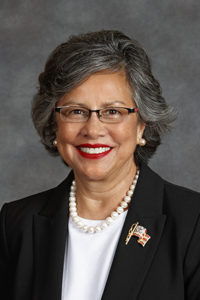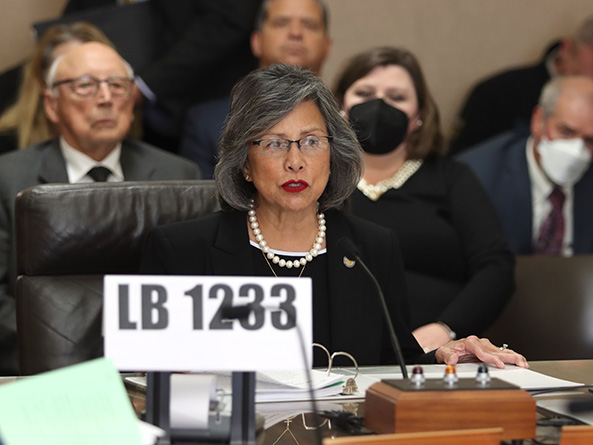Offutt funding proposals considered
The Appropriations Committee considered two proposals Feb. 10 to help fund projects related to Offutt Air Force Base.
During the 2021 session, lawmakers authorized a $50 million transfer from the state’s Cash Reserve Fund to the United States Space Command Headquarters Assistance Fund, to be transferred only if Offutt Air Force Base was chosen as the site of U.S. Space Command Headquarters. A different site was chosen later that year.
Under an amended version of her LB1233, Bellevue Sen. Rita Sanders proposed a way to “repurpose” $30 million of the original $50 million authorization.

Under the proposal, the United States Space Command Headquarters Assistance Fund would become the Military Base Development Fund and receive $30 million. The fund, which would be administered by the Commission on Military and Veteran Affairs, could be used for non-mission critical projects on military bases in Nebraska such as an outdoor pavilion, improvements at Willow Lakes Golf Course, landscape enhancements and a rooftop garden at Offutt Air Force Base.
Matching private funds equal to at least half of the entire cost of a project would be required before any expenditures would be authorized.
“This allows the Legislature to keep its commitment to Offutt to grow … even if it’s not the way we [originally] hoped,” Sanders said. “Offutt’s infrastructure and amenities are holding it back.”
Jeff Mikesell, director of military affairs for the Greater Omaha Chamber of Commerce, testified in support of the measure. Competition for military missions is “fierce,” he said, and federal dollars are unlikely to be invested in bases if states don’t also invest in them.
In addition, he said, military personnel are more likely to remain in Nebraska when their service is complete when they feel valued. If the state could encourage half of the Air Force personnel who separate from Offutt every year to stay in Nebraska, it would have a $75 million economic impact on the state, Mikesell said.
LB1232, sponsored by Omaha Sen. Mike McDonnell, would transfer the remaining $20 million of the original authorization from the Cash Reserve Fund to the Site and Building Development Fund and earmark it to establish a U.S. Strategic Command Nuclear Command, Control and Communications (NC3) public-private partnership facility.

A grant applicant would be required to provide the state Director of Economic Development with documentation of a $20 million match in private or other funds.
McDonnell said that while it was a disappointment that Offutt was not to chosen as the home for U.S. Space Command headquarters, his proposal would have an even longer-range impact on Nebraska’s economy. The funds would be used to help develop an off-base facility to foster collaboration between startups, the commercial defense industry and academia in support of NC3.
“This opportunity is unique because it not only provides tremendous economic development potential for both entrepreneurs and workers, but for our entire state in expressing our commitment to USSTRATCOM and retaining the NC3 mission,” McDonnell said.
Ted Carter, president of the University of Nebraska System and chairperson of the Nebraska Defense Research Corporation board of directors, testified in support of the proposal. He said the university was asked to enter into a partnership intermediary agreement with the federal government to create the research entity in order to bring together “the best minds in the state” to plan for the future of NC3.
Carter said the facility’s work would include planning for the development of future satellites, radios, aircraft and other systems that connect nuclear platforms and weapons to military and national leaders.
“This is our opportunity to create an innovation hub that will attract major defense contractors and small and emerging businesses in the NC3 mission space to Nebraska,” Carter said.
Jennifer Creager, testifying on behalf of the Greater Omaha Chamber and the Nebraska Chamber of Commerce and Industry, also testified in support. She said the coalition that formed last year to attempt to bring U.S. Space Command headquarters to Nebraska found other ways that the state could support the Offutt community.
“[These funds would] further solidify the crucial role that Offutt plays in our national defense,” Creager said. “This project will spur greater investment in our state and engage the private defense industry in a more significant way.”
No one spoke in opposition to either proposal and the committee took no immediate action on the bills.


